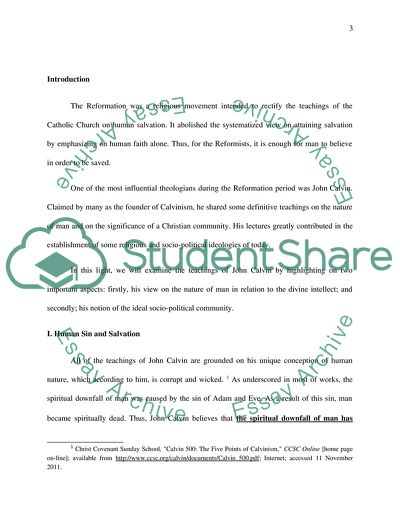Cite this document
(Exploring John Calvins Views on the Doctrinal Downfall of Man Literature review Example | Topics and Well Written Essays - 1750 words - 1, n.d.)
Exploring John Calvins Views on the Doctrinal Downfall of Man Literature review Example | Topics and Well Written Essays - 1750 words - 1. https://studentshare.org/religion-and-theology/1760226-calvins-view-of-the-biblical-doctrine-of-the-fall-of-man-resistence-to-tyrannical-government-and-argument-for-limited-government
Exploring John Calvins Views on the Doctrinal Downfall of Man Literature review Example | Topics and Well Written Essays - 1750 words - 1. https://studentshare.org/religion-and-theology/1760226-calvins-view-of-the-biblical-doctrine-of-the-fall-of-man-resistence-to-tyrannical-government-and-argument-for-limited-government
(Exploring John Calvins Views on the Doctrinal Downfall of Man Literature Review Example | Topics and Well Written Essays - 1750 Words - 1)
Exploring John Calvins Views on the Doctrinal Downfall of Man Literature Review Example | Topics and Well Written Essays - 1750 Words - 1. https://studentshare.org/religion-and-theology/1760226-calvins-view-of-the-biblical-doctrine-of-the-fall-of-man-resistence-to-tyrannical-government-and-argument-for-limited-government.
Exploring John Calvins Views on the Doctrinal Downfall of Man Literature Review Example | Topics and Well Written Essays - 1750 Words - 1. https://studentshare.org/religion-and-theology/1760226-calvins-view-of-the-biblical-doctrine-of-the-fall-of-man-resistence-to-tyrannical-government-and-argument-for-limited-government.
“Exploring John Calvins Views on the Doctrinal Downfall of Man Literature Review Example | Topics and Well Written Essays - 1750 Words - 1”. https://studentshare.org/religion-and-theology/1760226-calvins-view-of-the-biblical-doctrine-of-the-fall-of-man-resistence-to-tyrannical-government-and-argument-for-limited-government.


